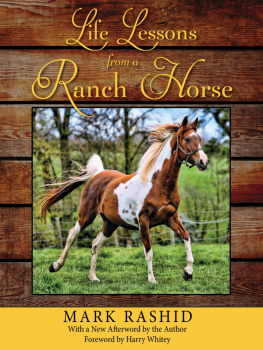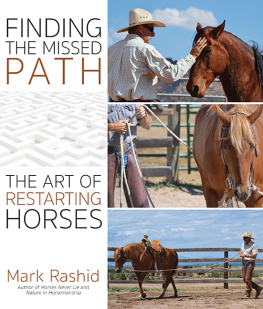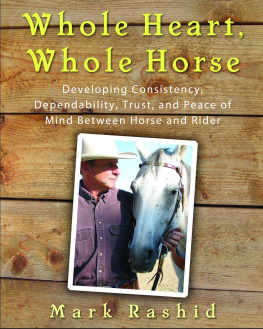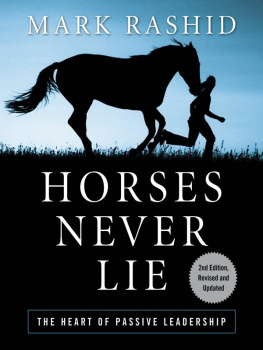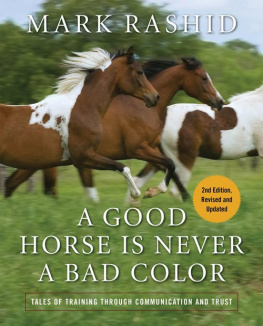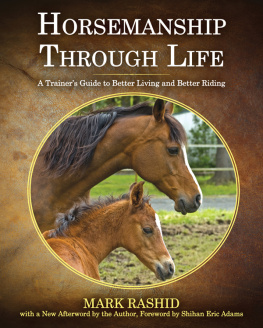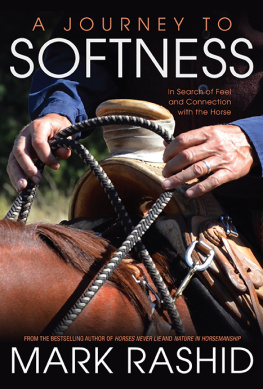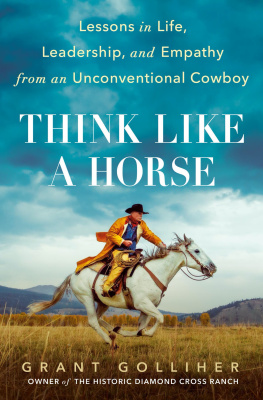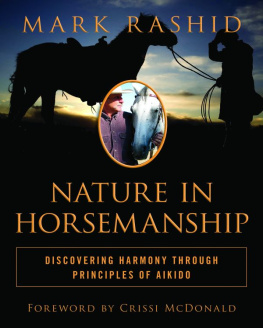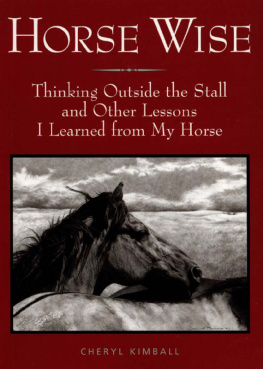Life Lessons from a Ranch Horse
Also by Mark Rashid
Horses Never Lie:
The Heart of Passive Leadership
A Good Horse Is Never a Bad Color
Considering the Horse:
Tales of Problems Solved and Lessons Learned
Life Lessons from a Ranch Horse
Second Edition
Mark Rashid
With a New Afterword by the Author
Foreword by Harry Whitney

Skyhorse Publishing
Copyright 2011 by Mark Rashid
All Rights Reserved. No part of this book may be reproduced in any manner without the express written consent of the publisher, except in the case of brief excerpts in critical reviews or articles. All inquiries should be addressed to Skyhorse Publishing, 307 West 36th Street, 11th Floor, New York, NY 10018.
Skyhorse Publishing books may be purchased in bulk at special discounts for sales promotion, corporate gifts, fund-raising, or educational purposes. Special editions can also be created to specifications. For details, contact the Special Sales Department, Skyhorse Publishing, 307 West 36th Street, 11th Floor, New York, NY 10018 or info@skyhorsepublishing.com.
Skyhorse and Skyhorse Publishing are registered trademarks of Skyhorse Publishing, Inc., a Delaware corporation.
www.skyhorsepublishing.com
10 9 8 7 6 5 4 3 2 1
Library of Congress Cataloging-in-Publication Data is available on file.
ISBN: 978-1-61608-340-3
Printed in China
Contents

I WAS TALKING TO Mark Rashid a few days ago. In among a whole series of stories, it came to light that he was writing yet another book. Now most of us could put all we have to say of any value on top of the eraser of this pencil Im writing with. So, after three books, what more could Mark have to say?
I was introduced to Mark through his books. A mutual friend read Considering the Horse and said I had to read it. As soon as I did, I liked the man I saw through these stories. Cant help but like a good storyteller.
Then came book two, A Good Horse Is Never a Bad Color, and more good stories. But then, there was maybe something more than just a storyteller here, because in each story was a message to be learned about horses and people living in the same world. So now he was not only a storyteller, but sort of a friend, too. Even before meeting him, I considered Mark a friend who cares enough to tell a story we might learn from.
Then I met my friend face to face and saw him work with students and their horses. I watched and realized that this storyteller was a wonderful teacher, taking time to help people understand their horses and to help them learn how to find the try. Thats when I met the horseman in Mark. As he worked to help people, I saw him searched for that little try in the horsethe one that keeps the horse from getting discouraged and allows it to search for what Mark wants and maybe even want to be around him.
Then came another book, Horses Never Lie. This time I could recognize the writer in Mark. To put stories in print is one thing, but to bring together real-life situations with a common theme to help us get the point takes a good writer.
In this book, Life Lessons from a Ranch Horse, Ive met yet another side of Mark. Or is it? Maybe its what makes all the other parts of Mark shine through. For in this book, I see what a thinker Mark is. Here he writes stories of his horse friend, Buck, and what a better teacher and horseman he is because of Buck. Now, many of us could experience the same things and not give it another thought, but not Mark.
As you read this book, consider how much Mark has thought about these things. Maybe thats why Buck didnt give up trying to teach Mark. He knew Mark was thinking and just needed time.
But do we take the time to think on similar things? Through this book, I believe Mark is trying to get us to see how much a horse can teach us, as well as share the lessons he learned. But is Mark also trying to get us thinking? Thinking about what our horses could teach us. Thinking about how much thought can go into an important lesson. Thinking about how much our horses just might be thinking themselves. It seems to me all the great horsemen Ive been around are real thinkers.
So, Mark, thank you for thinking. Thinking about how people might best enjoy a story. Thinking hard about how to teach us by making the point of the story clear. Thinking about how to explain what you learned from horses to help us all to become better horsemen. Thinking about how you approach and treat others, so that theyre not just students but feel like friends. Thinking about writing more books, since they keep getting better and we need them.
So back to my question. What more could Mark have to say? This book proves there is plenty. As you read this book, I hope you embark on a journey of thinking. So, read it, enjoy it, THINK!
HARRY WHITNEY
FOREWORD TO THE FIRST EDITION

MANY YEARS AGO I had the opportunity to meet a great singer/songwriter from West Virginia named Larry Groce. Some folks may remember Larry from the 1970s when he had a hit song titled Junk Food Junkie, from an album (remember albums?) of the same name. At the time I was playing guitar in a bluegrass band, and we just happened to play a number of songs from Larrys album.
A few months after meeting Larry, I called him to ask if hed like to come to our area and do a show, which he said hed be happy to do. I mentioned that our band knew just about every song from that album, and we played them nearly note for note the way hed recorded them. At that time, he was performing without a band when he traveled, so I told him wed be happy to be his band for the show. There was a brief silence on the other end of the line.
Then, almost apologetically, he said, Well, actually, Mark, I dont really play those songs very much anymore.
You dont? I replied in surprise.
No, he said. That record is over ten years old and Im kind of on to other things now.
But theyre such great songs, I said.
Yes, they are, he said. But there are other great songs out there, too.
I sat holding the phone, somewhat flabbergasted. What did he mean he was on to other things? What did he mean there were other great songs? Our band had just begun to know his music, only to find that he was no longer playing it. What a shock!
I had a hard time understanding why anybody would want to relinquish something so wonderful, just leaving it behind and moving on.
The night of the show I finally understood why. Larry had called back a few days later to say hed like to do some of the old songs with our band, after all. We opened the show with him, performing five or six songs from the album, and as promised, we did them note for note, and they did indeed sound just like the record. Then we left the stage, and Larry did a set of music alone.
Armed with only his new music and his guitar to accompany him, Larry brought the house down. The reason hed moved on to other things was clear to mehe wanted to get better at his music. And he most certainly had. The old songs were great, and he performed them wonderfully. But the new stuff was even better, and so was he.
Larry hadnt abandoned his old music or left his old music behind. He had simply taken it with him as he moved forward. It was an indication of someone who wasnt satisfied with the status quo, even though it had gotten him where he was. It was the sign of someone in search of mastering his craft.
Next page
